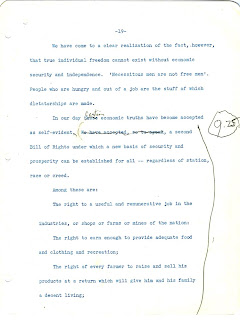As the Terry Hartle writes in his Christian Science Monitor review, the book is "detailed, insightful, and reads like a novel." More to the point, I keep finding myself longing for the complex and mature leadership this country received from FDR.
Yesterday I learned yet one more new thing about Roosevelt's determination to influence American politics for the better. In his January 11, 1944, State of the Union Address, he included what has come to be called the "Second Bill of Rights" (or "Economic Bill of Rights").
Here are images of the transcript from which Roosevelt read his radio address. Copied below is the text of that bill of rights, plus the words he spoke to underscore its importance.
These are the words with which FDR ended that address, just months before D-Day.
This Republic had its beginning, and grew to its present strength, under the protection of certain inalienable political rights—among them the right of free speech, free press, free worship, trial by jury, freedom from unreasonable searches and seizures. They were our rights to life and liberty.
As our Nation has grown in size and stature, however—as our industrial economy expanded—these political rights proved inadequate to assure us equality in the pursuit of happiness.
We have come to a clear realization of the fact that true individual freedom cannot exist without economic security and independence. "Necessitous men are not free men." People who are hungry and out of a job are the stuff of which dictatorships are made.
In our day these economic truths have become accepted as self-evident. We have accepted, so to speak, a second Bill of Rights under which a new basis of security and prosperity can be established for all regardless of station, race, or creed.
Among these are:
All of these rights spell security. And after this war is won we must be prepared to move forward, in the implementation of these rights, to new goals of human happiness and well-being.
- The right to a useful and remunerative job in the industries or shops or farms or mines of the Nation;
- The right to earn enough to provide adequate food and clothing and recreation;
- The right of every farmer to raise and sell his products at a return which will give him and his family a decent living;
- The right of every businessman, large and small, to trade in an atmosphere of freedom from unfair competition and domination by monopolies at home or abroad;
- The right of every family to a decent home;
- The right to adequate medical care and the opportunity to achieve and enjoy good health;
- The right to adequate protection from the economic fears of old age, sickness, accident, and unemployment;
- The right to a good education.
America's own rightful place in the world depends in large part upon how fully these and similar rights have been carried into practice for our citizens. For unless there is security here at home there cannot be lasting peace in the world.
One of the great American industrialists of our day—a man who has rendered yeoman service to his country in this crisis-recently emphasized the grave dangers of "rightist reaction" in this Nation. All clear-thinking businessmen share his concern. Indeed, if such reaction should develop—if history were to repeat itself and we were to return to the so-called "normalcy" of the 1920's—then it is certain that even though we shall have conquered our enemies on the battlefields abroad, we shall have yielded to the spirit of Fascism here at home.
I ask the Congress to explore the means for implementing this economic bill of rights—for it is definitely the responsibility of the Congress so to do. Many of these problems are already before committees of the Congress in the form of proposed legislation. I shall from time to time communicate with the Congress with respect to these and further proposals. In the event that no adequate program of progress is evolved, I am certain that the Nation will be conscious of the fact.
Our fighting men abroad—and their families at home—expect such a program and have the right to insist upon it. It is to their demands that this Government should pay heed rather than to the whining demands of selfish pressure groups who seek to feather their nests while young Americans are dying.
The foreign policy that we have been following—the policy that guided us at Moscow, Cairo, and Teheran—is based on the common sense principle which was best expressed by Benjamin Franklin on July 4, 1776: "We must all hang together, or assuredly we shall all hang separately."
I have often said that there are no two fronts for America in this war. There is only one front. There is one line of unity which extends from the hearts of the people at home to the men of our attacking forces in our farthest outposts. When we speak of our total effort, we speak of the factory and the field, and the mine as well as of the battleground—we speak of the soldier and the civilian, the citizen and his Government.
Each and every one of us has a solemn obligation under God to serve this Nation in its most critical hour—to keep this Nation great—to make this Nation greater in a better world.
We need to hear them again now.
Addendum: From In Roosevelt History, the blog of the Franklin D. Roosevelt Presidential Library and Museum, here is a post published on November 7, 2011, the 49th anniversary of Eleanor Roosevelt's death.








